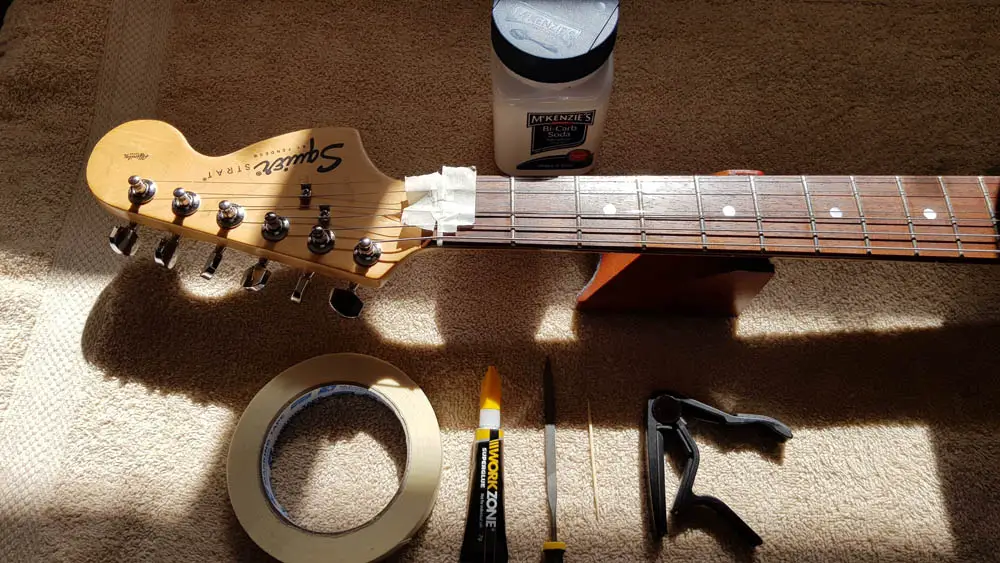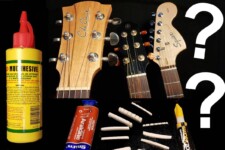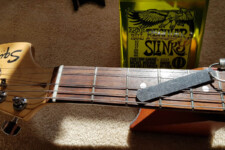Guitar Fret Buzz on One String (Find & Fix String Buzz)
One of the most annoying things as a guitarist is when your guitar has an annoying fret buzz on just one string, and you can’t for the life of you work out why.
Instead of just giving up and hoping it will go away, there are a number of things you can look at to find the cause of your problem and make that buzz disappear.
What seems like a fret buzz may not be a fret buzz at all, so it’s worth looking into this problem soon in case there is a more serious problem looming that you can fix now easily.
You’ll also find that constant buzzing on one string will impact your concentration, and can slow down your progress as a guitarist.

We work with various affiliate programs. If you purchase via our links we may earn a small commission at no extra cost to you.
What Causes Fret Buzz?
Fret buzz is a common problem, and happens when the strings vibrate against the frets causing that annoying metallic zinging sound, sometimes making high strings sound like a Sitar.
This can be caused by a number of things, including incorrect string height, incorrect string tension, high frets, or a bowed neck.
Sometimes you may think the sound you hear is fret buzz when in fact the problem lies somewhere else. You can get similar sounds from a string rattling at the nut, a poorly fitted bridge pin, an electric guitar bridge or saddle, or more.
Don’t forget that the nut also acts as a fret, and open string buzzing can be caused by incorrectly filed nut slot.
How Can Only One String Cause Fret Buzzing?
As annoying as this is, it’s quite a common thing to happen on a guitar and I’ve often seen it happen after making some type of change, even down to a string change.
Most problems are common to both electric and acoustic guitars, and a few are specific to only one.
Here are some reasons why this can happen on one string only (electric and acoustic guitars):
- An incorrectly filed or worn nut slot
- A worn fret
- A high fret
- Changed string gauge
- Neck warped (twisted)
- Incorrect neck relief
- A loose part on the bridge
- A loose part on a tuner
- A pickup magnet set too high
As you can see, there are many things you can look at; so start with the easiest to spot things first, working your way toward trickier problems.
How to Find the Cause of Your Buzzing
Before you start looking into your string buzzing problem, keep an open mind to the fact that not all buzzing is due to a fret problem, and what seems like fret buzz may actually be something else.
If you are only getting buzzing at one particular fret on the neck, and don’t hear it on the open string then the problem is easier to find.
Single string fret buzz at one (or more frets) is most likely due to a nut slot, a fret sitting higher at one end, or a low spot on the next fret down the neck.
Let’s start to look at particular causes one-by-one, and discuss how to fix them.
How Do You Get Rid of Fret Buzz on the First Fret?
The most likely cause of a single string buzzing on the first fret is the nut slot for that string being too low (too deep).
Alternatively, if you just changed to a lighter gauge string there is a small chance the new string sits lower in the nut slot, or is rattling around in the nut slot since the slot could be too wide.
This can cause the string to vibrate against the fret when played open, and you should find that when you hold the string at the first fret the buzzing stops.

You can fix these problems by filling the nut slot (super glue and baking powder work well!) and re-filing the slot, or replacing the nut completely.
How Do You Get Rid of Fret Buzz on a Single Fret?
When only one string has fret buzz on a single fret, the most likely cause is a flat spot on the crown of the previous fret. This causes the string to sit too low when you hold it, making it buzz on the next fret.
Alternately, if you get fret buzz only on the low or high E strings and don’t have any worn frets, you may find the end of a fret is sitting slightly high.
This can happen if the neck has dried more since it was first made, and can happen when the wood was too green when the neck was made, or if the guitar has been in a dry environment. This causes the fret slots to open slightly and can allow a fret to spring up a little.
Alternatively if the fret has taken a bump it may have dislodged it slightly, or the factory process didn’t push the fret into the slot completely.
If you have a flat spot causing the buzzing, then you will need to get the frets leveled by a guitar tech, and if you have a high fret edge you may be able to gently tap it down with a brass or plastic-ended hammer.
Finding High Spots on Frets to Stop String Buzz
The easiest way is to use a perfectly flat-edged sheet of metal (or a fret rocker), and place it across 3 frets at the place where you get the string buzzing.
If the metal rocks back and forth slightly you will know that the center fret it rocks on has a high point which needs to be filed down.
Neck Relief Buzzing Problems
Incorrect neck relief is more likely to cause buzzing across multiple strings, but it’s still worth checking your truss rod adjustment to make sure there is enough relief in the neck.
This issue could present itself more in the low strings, since they vibrate in a wider pattern than the high strings.
Single String Buzz on a Fret and Also Open
Sometimes a string will sound like it is buzzing when played on some frets as well as played open, and this usually indicates that the problem is not a fret.
Different strings vibrate at different frequencies, and a particular frequency of one string could be causing a buzzing sound by making one of the hardware components vibrate.
1. Electric Guitar Bridge Issues
Check your bridge carefully for any loose screws, and check the surface of the saddle is not damaged where the string rides over it. If you have a tremolo block attached to the bridge, also check that it is screwed on tightly.
If you have a tremolo arm, try removing it to see if that resolves your buzzing, you may need a small spring under it to give it some tension.
2. Bridge Pin Issues on Acoustic Guitars
Acoustic guitar bridge pins can cause buzzing issues if the hole they fit in has become enlarged, or if the string ball-end was not inserted properly and hangs loose inside the guitar body.
Make sure the bridge pin fits tightly on your buzzing string, also that the ball is pulled up tightly against the pin as you push it firmly into the hole. A common problem is when the ball lodges on the bottom of the pin instead of pulling up into the slot on the side of the pin.
3. Tuner Issues
Tuners can become loose over time, and the string’s vibration will directly cause the loose parts on it to buzz.
Check that the nut securing the tuner on the neck is firmly tightened, and that the screw holding the knob on the tuner is tight also.
4. Electric Guitar Pickup Height too High
If your pickups are set too close to the strings, the magnetic force can pull the strings down toward the fretboard, and could cause buzzing.
Take a look at the pickups (particularly the neck pickup) and make sure they are not on a greatly different angle than the body.
If you have staggered poles in your pickups, then the highest poles could be causing the issue on just one or two strings. If you’re not sure, then just note your current pickup position and then wind your pickups down far too low to see if your buzzing goes away.
5. A Warped Neck and String Buzz
This is a less common problem, but if you look down your guitar neck from one end and see a twist in the neck this could be the cause of your string buzz.
This causes the frets to be out of alignment, and at the very least a guitar tech may be able to resolve this with a fret level, but for serious warping it could be game over for your neck.




